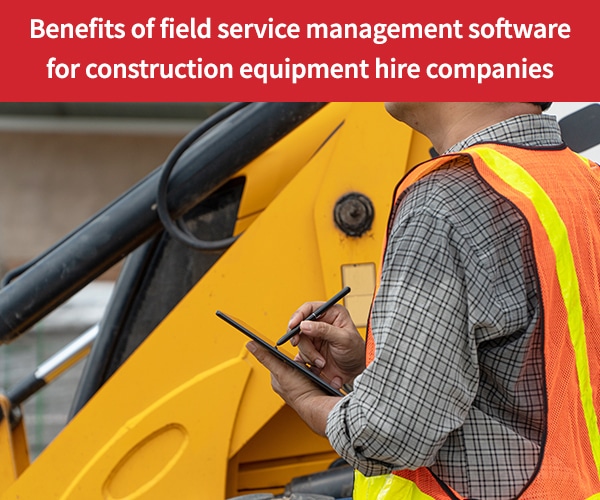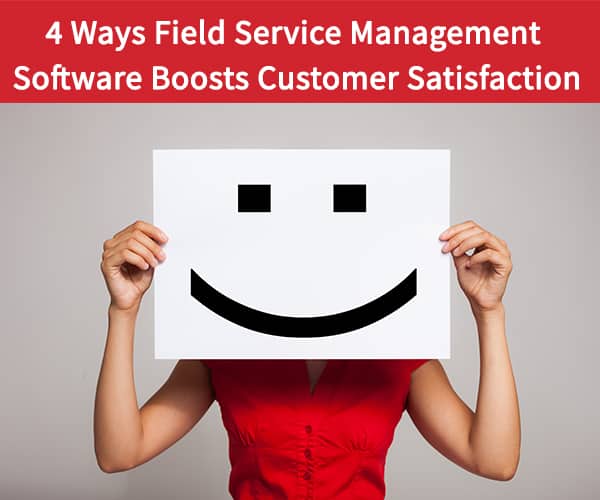
- Software
Building a strong brand in equipment hire relies on field service software
The UK construction equipment hire market is a multi-billion pound sub-sector of the UK construction industry, providing a critical service; enabling contractors to lease or rent a wide range of equipment and machinery, from cranes to power tools for projects large and small. In recent years the construction equipment hire market has been valued at between £6.5bn and £7bn. In 2021 the market has declined to around £6.3bn, impacted by supply chain disruption across the UK construction sector, due to demand for materials and logistics capacity outstripping supply.
Construction equipment hire sector overview
The construction equipment hire market is highly competitive and players span large, national equipment rental companies to local independents. Consolidation is occurring as the bigger players expanding through organic growth or through acquiring smaller providers to grow their market share. Earth moving equipment, including excavators, represents the largest construction equipment sub-segment, accounting for around 22% of all hire value. Other key sectors include lifting and access equipment, such as cranes and forklifts. Through renting out equipment, machinery and vehicles, construction equipment hire companies enable building developers and subcontractors to focus on the job of executing building projects, as opposed to take on the capital, operating and compliance risks that purchasing construction equipment can entail. Types of equipment for hire in the UK construction industry:
- Lifting, such as cranes, powered access and forklift/materials handling
- Earth moving, including excavators, dump trucks and site dumpers
- Access equipment, including scaffolding, access towers, ladders and suspended access
- Refuse/waste, such as skips and rubbish chutes
- Miscellaneous, including power tools, portable buildings, portable generators and transport vehicles.
2021 is proving to be a tumultuous year for the construction sector. Increased business across house building, commercial work and civil engineering resulted in the strongest growth since September 2014, according to the IHS Markit/CIPS UK Construction Purchasing Managers’ Index, as projects resume post-2020 lockdowns due to the pandemic. But, this sharp upturn in work has resulted in demand for materials and products, outstripping supply, leading to price hikes.
Smart solutions to boost productivity
In such a disrupted environment, construction equipment companies need to improve their oversight of their delivery and retrieval as well as tracking of equipment. Better control over these activities allow hire companies to raise their productivity, fulfil more equipment orders, reduce billing and invoicing timeframes and improve client relations. Construction equipment and vehicle hire companies can adopt advanced field service management platforms to enhance their businesses in a number of ways:
A flexible field service solution
Selecting a flexible field service management solution can allow these companies to create different types of forms for the various services that they provide, from renting construction equipment, with or without an operator, or subsets of equipment such as power tools, to hiring trucks, with a driver or without a driver. Larger construction equipment hire companies tend to operate multiple depots across different regions, or they may operate in additional markets to construction, such as outdoor events, or focus on serving specific end-user industries, like telecoms. Top field service management software platforms are flexible so that these organisations can deploy the technology to meet the needs of different business groups and teams. Each depot or division can operate its own service calls schedule, for example.
Ability to integrate with existing IT platforms
Advanced field service management solutions are designed to interface with existing IT systems software, including enterprise resource planning (ERP) and customer relationship management (CRM) software. Simple configuration with Sage 100cloud software, for example, results in a 100% paperless field service process, to provide an accurate, up-to-date and comprehensive picture of the entire process. Managing jobs, maintenance activities, producing contracts, or invoice raising can all be achieved without having to do duplicate entries.
Easy to use app for operators and drivers
For drivers and personnel delivering equipment to construction sites, mobile field service software is easy to access via an app on their smartphone, which provides them with all the information they need, whether it is a daily or weekly schedule of drop-offs and collections, or the fastest route to a customer site, to digital versions of all forms and paperwork that need to be signed by clients. On the operations side, real-time monitoring capabilities provide insight into whether drivers have received and read their work orders.
Streamline invoicing and paperwork
Billing and invoicing time is reduced significantly with work order tracking software applications, provided by field service management solutions. Once validated, signed work orders can be instantly sent to the relevant group within the construction equipment hire company so it can be processed immediately by administrative staff, who can generate an invoice and email it to the customer. The field service management software is easy to use and accessible so that electronic work orders can be sent to all parties once raised, to field personnel and drivers, internal administrative teams, customers and even external agencies providing temporary workers. Construction equipment hire companies can implement field service management software to digitalise paperwork, apply consistency in terms of how information is structured, as well as store and retrieve digitalised records and paperwork more quickly. Some equipment hire companies that have embraced workforce management software, rolling out the technology among their entire driver fleets, have seen order-related productivity gains of 15%, which translates into time savings for drivers, in addition to improving responsiveness, which is appreciated by clients.
Optimise equipment maintenance
A key aspect of running a successful construction equipment hire firm is dependent on keeping equipment, machinery, vehicles or tools well maintained and ensuring any necessary inspections and checks are carried out. Field service management software can help these businesses ensure that their hire equipment uptime is maximised. Equipment breakdowns on site can slow down construction projects or even bring them to a halt, frustrating clients, which may have to revise schedules if significant delays occur. Software for preventative maintenance enables equipment hire companies to schedule routine equipment inspections or servicing work. The software can also be used to for scheduling call-outs when drivers have to be dispatched to repair equipment on site. Smart scheduling features can ensure the driver closest to the site is dispatched once the call is logged. Drivers can also immediately access information about the equipment, such as troubleshooting guides or even previous repair records and service history to enable them to fix the equipment more quickly. If equipment has to be replaced, new documentation or forms can be instantly accessed and sent to the client for signing.
Prepare construction equipment hire businesses for next phase of growth
Construction projects rarely run to time or complete without a hitch. Building developers and project managers try to minimise the risks involved in these projects by using reliable and responsive subcontractors and the same is expected from equipment hire providers. As many equipment hire firms grow their businesses, either by opening new locations to meet demand in new areas or diversify into new areas, like event services or vehicle hire, rolling out field service management software across multiple depots and various business units establishes consistency across the entire group, whether it is streamlining actions like automatic customer billing when equipment is return to a depot, or boosting driver productivity and response times. When the strategic objective is about establishing a strong brand in equipment hire services, built on reliability and trust, the question is whether such businesses can afford not to implement field service management tools.
Our similar articles.
-
- Field Service Management
- Software
- Customer Satisfaction
- Customer satisfaction
- Software
4 Ways Field Service Management Software Boosts Customer Satisfaction
April 24, 2018 -
- Maintenance
- Software
- Optimization
6 steps to choose your maintenance software
December 20, 2018 -
- Field Service Management
- Technician
- Software
- scheduling
- dispatching
Whitepaper: Improve scheduling & dispatching for your team of field service technicians
September 7, 2023


